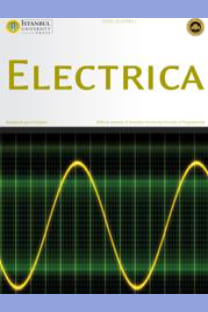Differential Chaos Shift Keying-Assisted Media-Based Modulation
This study proposes a new energy-efficient and high data-rated communication technique by combining media-based modulation (MBM) and differential chaos shift keying technique (DCSK), called DCSK–MBM. The MBM technique, which forms the infrastructure of this proposed system, is one of the newest members of the index modulation family, while DCSK offers considerable performance improvements for fading channels. Communication comprises two stages in the DCSK system. In the first stage, only the reference symbol is transmitted to the receiver side, whereas in the second stage, information is carried along with the reference symbol. The negative aspect of this method is that it reduces both transmission data rate and spectral efficiency. The MBM technique provides a significant increase in both spectral efficiency and data rate because it performs index modulation with reconfigurable antennas and transmits extra information bits. To minimize the disadvantages of the DCSK technique and create a more energyefficient and high data-rated technique, the MBM technique is combined with the DCSK technique. Thus, considerable progress is made. All performance analyses are performed over Rayleigh fading channels for M-ary phase shift keying/quadrature amplitude modulation
___
1. S. Buzzi, I. Chih-Lin, T. E. Klein, H. V. Poor, C. Yang, A. Zappone, "A survey of energy-efficient techniques for 5G networks and challenges ahead", IEEE J. Sel. Areas Commun., vol. 34, no. 4, pp. 697- 709, April, 2016. [Crossref]2. S. K. Sharma, I. Woungang, A. Anpalagan, S. Chatzinotas, "Towards tactile internet in beyond 5G era: Recent advances, current issues and future directions", IEEE Access, pp. 1-1, March, 2020. [Crossref]
3. J. Navarro-Ortiz, P. Romero-Diaz, S. Sendra, P. Ameigeiras, J. J. Ramos-Munoz, J. M. Lopez-Soler, "A survey on 5G usage scenarios and traffic models", IEEE Commun. Surv. Tutorials, pp. 1-1, February, 2020. [Crossref]
4. X. Chen, D. W. K. Ng, W. Yu, E. G. Larsson, N. Al-Dhahir, R. Schober, "Massive access for 5G and beyond", February, 2020. [Crossref]
5. E. Aydin, F. Cogen, E. Basar, "Code-index modulation aided quadrature spatial modulation for high-rate MIMO systems", IEEE Trans. Veh. Technol., vol. 68, no. 10, pp. 10257-10261, 2019. [Crossref]
6. M. Wen, X. Cheng, L. Yang, Index modulation for 5G wireless communications. Cham: Springer International Publishing, 2017. [Crossref]
7. E. Basar, M. Wen, R. Mesleh, M. Di Renzo, Y. Xiao, H. Haas, "Index modulation techniques for next-generation wireless networks", IEEE Access, vol. 5, pp. 16693-16746, August, 2017. [Crossref]
8. F. Cogen, E. Aydin, N. Kabaoğlu, E. Başar, H. Ilhan, "Code index modulation and spatial modulation: A new high rate and energy efficient scheme for MIMO systems", in 2018 41st International Conference on Telecommunications and Signal Processing, TSP 2018, 2018. [Crossref]
9. E. Aydin, F. Cogen, "Two-way code index modulation", in 27th Signal Processing and Communications Applications Conference, SIU 2019, 2019. [Crossref]
10. Y. Naresh, A. Chockalingam, "On media-based modulation using RF mirrors", IEEE Trans. Veh. Technol., vol. 66, no. 6, pp. 4967-4983, June, 2017. [Crossref]
11. Y. Naresh, A. Chockalingam, "Full-duplex media-based modulation", in 2017 IEEE Globecom Workshops (GC Wkshps), vol. 2018-Janua, pp. 1-6, 2017. [Crossref]
12. F. Yarkin, I. Altunbas, E. Basar, "Cooperative space shift keying media-based modulation with hybrid relaying", IEEE Syst. J., vol. 14, no. 1, pp. 500-509, March, 2020. [Crossref]
13. W. Xu, T. Huang, L. Wang, "Code-shifted differential chaos shift keying with code index modulation for high data rate transmission", IEEE Trans. Commun., vol. 65, no. 10, pp. 1-1, October, 2017. [Crossref] 14. M. Türk, H. Oğraş, "Kaos tabanlı sayısal modülasyon tekniklerinin simulink ortamında modellenmesi ve benzetimi", Fırat Üniversitesi Fen Bilim. Derg., vol 30, no. 1, pp. 45-50, 2018.
15. X. Cai, W. Xu, L. Wang, F. Xu, "M-ary code-shifted differential chaos shift keying with in-phase and quadrature code index modulation", IET Commun., vol. 13, no. 19, pp. 3253-3259, December, 2019. [Crossref]
16. F. C. M. Lau, K. Y. Cheong, C. K. Tse, "Permutation-based DCSK and multiple-access DCSK systems", IEEE Transactions on Circuits and Systems I: Fundamental Theory and Applications vol. 50, no. 6, pp. 733-742, 2003. [Crossref]
17. G. Kaddoum, F. D. Richardson, F. Gagnon, "Design and analysis of a multi-carrier differential chaos shift keying communication system", IEEE Transactions on Communications, vol. 61, no. 8, pp. 3281-3291, 2013. [Crossref]
18. L. Wang, G. Cai, G. R. Chen, "Design and performance analysis of a new multiresolution M-ary differential chaos shift keying communication system", IEEE Transactions on Wireless Communications, vol. 14, no. 9, pp. 5197-5208, September, 2015. [Crossref]
19. Z. Galias, G. M. Maggio, "Quadrature chaos-shift keying: Theory and performance analysis", IEEE Trans. Circuits Syst. I Fundam. Theory Appl., vol. 48, no. 12, pp. 1510-1519, December, 2001. [Crossref]
- ISSN: 2619-9831
- Başlangıç: 2001
- Yayıncı: İstanbul Üniversitesi-Cerrahpaşa
Sayıdaki Diğer Makaleler
Ramanjaneyulu ALLA, Anandita CHOWDHURY
Quantitative Phase Macroscopic System for Label-Free Imaging of Tissue Sections
Three Speed Controllers of Direct Torque Control for a Doubly Fed Induction Motor Drive–A Comparison
Mohammed El MAHFOUD, Badre BOSSOUFİ, Najib El OUANJİLİ, Said MAHFOUD, Mohammed TAOUSSİ
Emre BAYAT, SULTAN ALDIRMAZ ÇOLAK
Ersin ALAYBEYOGLU, Hakan KUNTMAN
A Case Study on Fraudulent User Behaviors in the Telecommunication Network
Differential Chaos Shift Keying-Assisted Media-Based Modulation
Beyza ÖNAL, Erdoğan AYDIN, Fatih ÇÖGEN
Energy-Efficient Clustering-Based Mobile Routing Algorithm For Wireless Sensor Networks
